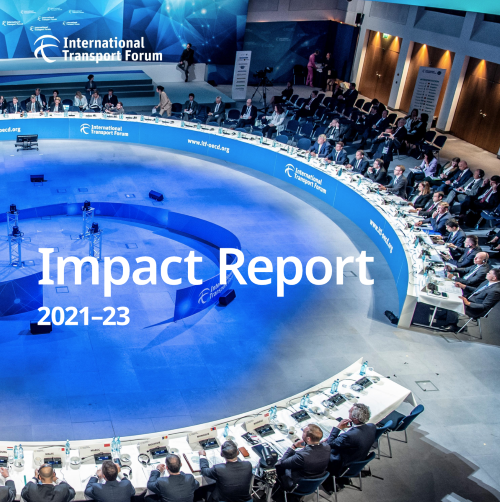Our Impact

The work of the ITF has informed transport policy decisions on issues as diverse as railroad regulation and road safety, accessibility and environmental standards, or market liberalisation for international road haulage services.
Seat belts, helmets for motorcyclists, speed limits, blood alcohol limits and targeted traffic education programmes were all pioneered by ECMT before becoming the norm.
More recently, the ITF’s work has been cited in statements by the White House, referenced in France’s mobility strategy for 2040–60, and turned into policy by ASEAN. A joint study with the OECD shaped key elements of Ireland’s Climate Action Plan 2023. For Israel, we developed a congestion charging proposal that the cabinet greenlighted. With funding from the European Commission, we developed a blueprint for introducing Mobility as a Service (MaaS) in Belgium’s Brussels Capital Region. The German government’s International Climate Initiative chose the ITF as a partner in a multi-year project for decarbonising transport in emerging economies. Among other things, it gave participating countries tailor-made modelling tools to help their transition to low-carbon transport.
The ITF’s twinning of countries with excellent road safety performance and others who want to reduce the number of crash victims has been hailed as “model of a multi-country effort” by the World Health Organization. ITF’s road safety data has been called “the best in the world” by Global NCAP, the Global New Car Assessment Programme.
Our flagship report ITF Transport Outlook has inspired the transport modelling of government departments from New Zealand and Canada to Ireland and Finland. The Transport Climate Action Directory, a database of decarbonisation measures that have been reviewed for their effectiveness, supports policy makers in the pursuit of their decarbonisation objectives.
We are a growing organisation. Brazil, Cambodia, Colombia and Costa Rica have all joined the ITF since 2021, taking our membership to 66 countries, from 54 only a decade ago.
The Annual Summit of the ITF has established itself as the leading global transport policy event since its launch in 2008. It brings together transport ministers, CEOs, Heads of International Organisations and thought leaders to discuss strategic issues and align views. More than 1400 participants from over 80 countries meet each May in Leipzig, Germany, for what has been called the "Davos of Transport".
In a regulatory capacity, ITF manages the Multilateral Quota system of licenses for international road haulage operations.